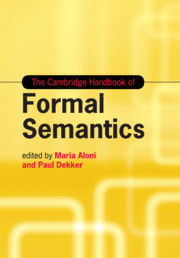Book contents
- Frontmatter
- Contents
- List of figures
- List of tables
- List of contributors
- Preface
- Part I The landscape of formal semantics
- Part II Theory of reference and quantification
- Part III Temporal and aspectual ontology and other semantic structures
- Part IV Intensionality and force
- Part V The interfaces
- 21 The syntax–semantics interface
- 22 The semantics–pragmatics interface
- 23 Information structure
- 24 Semantics and cognition
- 25 Semantics and computation
- Bibliography
- Index
22 - The semantics–pragmatics interface
from Part V - The interfaces
Published online by Cambridge University Press: 05 July 2016
- Frontmatter
- Contents
- List of figures
- List of tables
- List of contributors
- Preface
- Part I The landscape of formal semantics
- Part II Theory of reference and quantification
- Part III Temporal and aspectual ontology and other semantic structures
- Part IV Intensionality and force
- Part V The interfaces
- 21 The syntax–semantics interface
- 22 The semantics–pragmatics interface
- 23 Information structure
- 24 Semantics and cognition
- 25 Semantics and computation
- Bibliography
- Index
Summary
Introduction
Goals
The informational content conveyed by utterances has two sources:meaning as it is encoded in words and rules of semantic composition (often called literal or semantic meaning) and further inferences that may be obtained by reasoning on the speaker's motives (the conjunction of these inferences with the literal meaning is often called the strengthened or pragmatic meaning of the sentence). While in simple cases the difference can seem obvious enough, in general this is not so, and the investigation of the semantics–pragmatics interface has proven to be one of the most vibrant areas of research in contemporary studies of meaning. We will survey three domains – scalar implicatures, presuppositions, and conventional implicatures – in which there are considerable empirical benefits to be obtained from this enterprise. However, it is also of foundational and methodological interest: knowledge of semantic meaning is part of knowledge of language; by contrast, pragmatic inferences are derived in part from the assumption that the speaker obeys certain rules of behavior – typically ones dictated by rationality (which may, for instance, lead to the maximization of the utility of an utterance to the speaker or to others). Owing to foundational interest in the interaction between language and reasoning, the study of the semantics– pragmatics interface originated in philosophy; however, it quickly became a central topic within linguistics and psycholinguistics, and the convergence of results from these last two fields has resulted in rich cross-disciplinary exchanges. For reasons of space, we do not consider psycholinguistic results in this survey, but it should be said at the outset that they have changed the face of the field by providing new and more reliable data (for instance, on processing and language acquisition) and sometimes by challenging data that had too quickly become solidified on the basis of unsystematic introspection alone.
As we will see, the debates are more open than ever. Scalar implicatures, which were usually considered a staple of pragmatic reasoning, have recently been reassigned to the semantics or even to the syntax by proponents of locally computed implicatures (‘localists’ for short).
- Type
- Chapter
- Information
- The Cambridge Handbook of Formal Semantics , pp. 664 - 727Publisher: Cambridge University PressPrint publication year: 2016
- 29
- Cited by



